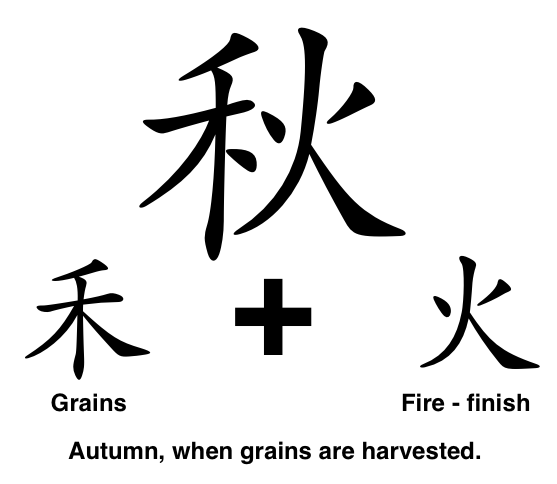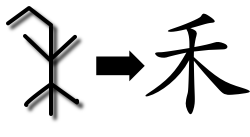Your cart is currently empty!
秋-Fall: not as complicated as it seems

秋 is the Chinese character for fall/autumn. In Japanese, it is read as “aki”. Chinese characters may seem like a very complicated way to write, but there is a method to them. Understand this method, and you can often make out what a character means even if you’ve never seen it. Most Chinese characters are combinations of a radical and additional strokes. The radical provides a base meaning and the additional strokes supply the sound and additional meaning. It’s similar to being able to understand English words that are made by compounding Latin and/or Greek words. For example, in medical terms, “itis” means inflammation. Anytime you read about a condition that ends in “itis”, you know you are dealing with a type of inflammation. Know the meaning of the part of the word before the “itis” and you know what is inflamed even if you’ve never seen the word before.
 In the case of the character for fall 秋 the radical is on the left and means a grain like rice or wheat. Originally, the shape of this radical looked like a stalk with an ear of grain hanging at the top. Over time it transformed into the shape it has now as shown on the right.
In the case of the character for fall 秋 the radical is on the left and means a grain like rice or wheat. Originally, the shape of this radical looked like a stalk with an ear of grain hanging at the top. Over time it transformed into the shape it has now as shown on the right.
This grain 禾 radical is combined with the character for fire 火 to signify the time of the year when grains are harvested. The character for fire 火 supplies the sound “shu” which is used when reading the character 秋 when it appears in compound words like 立秋 risshu which means the beginning of fall, literally when “fall stands up”.
There are 214 radicals and these form the base for all the thousands of Chinese characters. Often, by looking at the parts that make up a character, you not only can get a good idea what it means, you also know how to read it. That said, the history of Chinese characters is thousands of years old, and at different times, characters had different meanings and different sounds. So even though the basics are simple, it is still a complex method of writing, but one that provides a depth to writing that alphabetical writing systems like English lack. For example you can make puns not only based on the sounds of words, but on the letters of the words.
Leave a Reply
You must be logged in to post a comment.